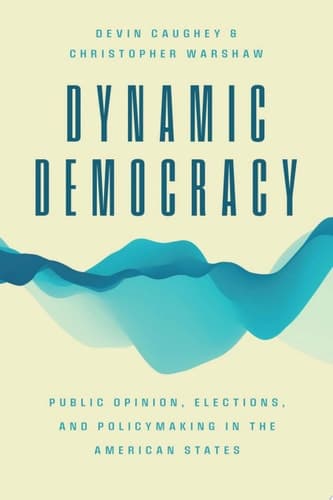
Dynamic Democracy: Public Opinion, Elections, and Policymaking in the American States (Chicago Studies in American Politics)
by Devin Caughey, Christopher Warshaw
Published 2022 by University of Chicago Press
230 pages
About this book:
A new perspective on policy responsiveness in American government.
Scholars of American politics have long been skeptical of ordinary citizens’ capacity to influence, let alone control, their governments. Drawing on over eight decades of state-level evidence on public opinion, elections, and policymaking, Devin Caughey and Christopher Warshaw pose a powerful challenge to this pessimistic view. Their research reveals that although American democracy cannot be taken for granted, state policymaking is far more responsive to citizens’ demands than skeptics claim.
Although governments respond sluggishly in the short term, over the long term, electoral incentives induce state parties and politicians—and ultimately policymaking—to adapt to voters’ preferences. The authors take an empirical and theoretical approach that allows them to assess democracy as a dynamic process. Their evidence across states and over time gives them new leverage to assess relevant outcomes and trends, including the evolution of mass partisanship, mass ideology, and the relationship between partisanship and ideology since the mid-twentieth century; the nationalization of state-level politics; the mechanisms through which voters hold incumbents accountable; the performance of moderate candidates relative to extreme candidates; and the quality of state-level democracy today relative to state-level democracy in other periods.
Scholars of American politics have long been skeptical of ordinary citizens’ capacity to influence, let alone control, their governments. Drawing on over eight decades of state-level evidence on public opinion, elections, and policymaking, Devin Caughey and Christopher Warshaw pose a powerful challenge to this pessimistic view. Their research reveals that although American democracy cannot be taken for granted, state policymaking is far more responsive to citizens’ demands than skeptics claim.
Although governments respond sluggishly in the short term, over the long term, electoral incentives induce state parties and politicians—and ultimately policymaking—to adapt to voters’ preferences. The authors take an empirical and theoretical approach that allows them to assess democracy as a dynamic process. Their evidence across states and over time gives them new leverage to assess relevant outcomes and trends, including the evolution of mass partisanship, mass ideology, and the relationship between partisanship and ideology since the mid-twentieth century; the nationalization of state-level politics; the mechanisms through which voters hold incumbents accountable; the performance of moderate candidates relative to extreme candidates; and the quality of state-level democracy today relative to state-level democracy in other periods.
Recommended in:
- There’s Been a Massive Change in Where American Policy Gets Made (Dec 6, 2022) with Jake Grumbach
Recommended with:

State Capture: How Conservative Activists, Big Businesses, and Wealthy Donors Reshaped the American Statesâand the Nation
Alexander Hertel-Fernandez

Paths Out of Dixie: The Democratization of Authoritarian Enclaves in America's Deep South, 1944-1972 (Princeton Studies in American Politics: ... and Comparative Perspectives, 147)
Robert Mickey

Fragmented Democracy
Jamila Michener

Private Government: How Employers Rule Our Lives (and Why We Don't Talk about It) (The University Center for Human Values Series, 44)
Elizabeth Anderson

Dilla Time
Dan Charnas